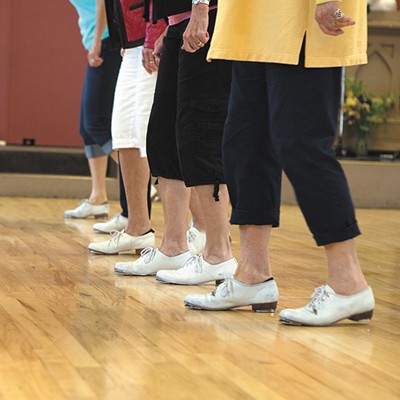Most everyone knows that babies and toddlers, teenagers and pregnant women have particular dietary needs, but less attention has been paid to figuring out how our nutritient needs change with aging. While the current recommended daily allowance for protein is the same for a 19-year-old as it is for a 50-year-old, evidence from a growing body of research indicates that eating more protein-rich foods may be beneficial for preserving muscle.
"As we age, we naturally lose muscle mass — even when we stay active — and our bodies don't utilize protein as well," says Spokane dietitian Joan Milton. Digestion is not as efficient, partly due to decreased stomach acid, and the body just doesn't create muscle tissue as readily as it used to. Older people also tend to eat less in general, further reducing the total protein in their diets.
New dietary guidelines are expected later this year, but Milton says she already recommends that her older clients increase their protein consumption by about 20 percent over the current recommended daily allowance. Katie Abrahamson, an Issaquah dietitian working in rehabilitation and long-term care, would bump that up by as much as 38 percent, to 82 grams for a 155-pound person.
"If someone wants to maintain or build muscle mass, especially if they are trying to lose weight, it's important to be getting a little more protein in," says Katie Nelson, a Spokane dietitian and certified strength and conditioning specialist.
Getting a serving of protein at each meal and in snacks is key. The meal where most people fall short is breakfast. A traditional breakfast might be a bowl of cereal with milk, a banana and juice. To bump it up, "Some simple changes may be having a hard-boiled egg with the cereal," says Abrahamson, or adding a serving of cottage cheese with fruit or some Greek yogurt. And yes, eggs are back in style. "The latest research shows you can have the whole egg, and it is not going to significantly affect your cholesterol level," she confirms. An added bonus: the protein in eggs is particularly easy for the body to use. A smoothie made with berries and a leafy green, such as spinach, with some powdered plant-based or whey protein thrown in, is another good breakfast choice, says Nelson. For lunch, she says to skip the drive-thru and head to the grocery store: "In a pinch, grabbing deli turkey and dipping it in hummus and avocado and having fruit and chopped-up vegetables" is a perfect choice. For snacks, Milton says, "A half-cup of nuts ... would provide protein and some 'good' fat."
Nelson cautions her clients, however, that just as important as getting enough protein is getting enough fruits and veggies. "The thing I see with my clients over and over again — it's all age groups, it's active people, it's nonactive people — they do not get in enough color, enough fruits and vegetables in their diet," she says. "People are coming in at two to three servings a day, when really, to get the vitamins, the minerals and antioxidants we need, we need up to 10 servings a day. When we're working out, we need even more than that to combat the inflammatory and the free-radical response we get from exercise."
So how can you tell if your diet has adequate nutrients? Keeping a food diary and discussing it with a professional is a good place to start. Nelson also recommends body composition testing to determine your lean body mass, which can help a dietitian fine-tune your dietary goals. At the doctor's office, a physical exam can reveal loss of muscle tissue, called sarcopenia. A simple blood test for serum albumin provides a window into the body's level of protein stores, but Abrahamson says to interpret results cautiously: "The downside is it can be impacted by a variety of things — if somebody's dehydrated, the albumin levels might look like they're good, but when they start to drink more fluid, their albumin levels may be low."
Making diet changes requires a certain open-mindedness, and Nelson admits that only about half of her clients are willing to change their habits. Those who do are rewarded with faster recovery from workouts, and in general, feeling better, she says: "There's lot of options. People just tend to get stuck thinking in old or traditional ways." ♦
Protein Calculator
Recommended daily allowance: Weight in pounds x .36 = grams of protein per day. Consider adding an extra 20 to 35 percent if you are older than 55.

























